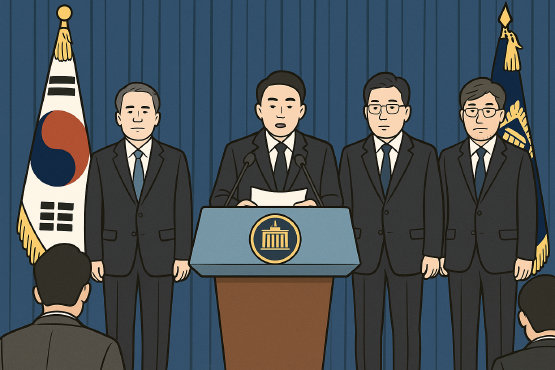Summary of the Lee Jae-myung Administration's Presidential Office Reform Plan: Key Points of the Citizen-Centered Organizational Restructuring
Background of the Reorganization: Implementation of National Sovereignty and Aim for Responsible Government
The Yoon Seok-yeol government has named itself a 'people's sovereignty government' and has carried out a major reorganization of the presidential office. This is not merely a readjustment of administrative structures but a philosophical declaration and practice of realizing a 'genuine republic where the will of the people is regularly reflected in state affairs.' This reorganization is designed around three main pillars: people's sovereignty, government accountability, and future orientation. Within it, the vision of a unified nation based on 'mutual respect and trust' is clearly expressed.
Major organizational change: from function-oriented to project-oriented
National Situation Room and National Crisis Management Center: Control Tower of National Governance The National Situation Room has expanded beyond simple reporting and coordination functions to encompass comprehensive command roles that transcend the silos between ministries. This enables faster and more consistent decision-making in times of crisis or when implementing key policies. In particular, the National Crisis Management Center has been elevated to report directly to the head of the National Security Office, enhancing the response system for complex crises such as disasters, security issues, and terrorism. This is regarded as a practical reform prioritizing the safety of the public. Integrated Listening Office: Moving Beyond Conflict Adjustment to Institutionalized Communication The Integrated Listening Office, which is an expanded version of the former Civil Society Office, serves as a bridge between the government and civil society. Notably, the establishment of a Youth Officer has opened a channel for incorporating the voices of younger generations into national governance. This measure elevates the quality of communication by institutionalizing and regularizing the collection of public opinions rather than simply serving as a promotional outlet. AI Future Planning Office: Proactive Investment Towards a Technology-Driven Nation In the context of rapid changes brought by the Fourth Industrial Revolution and AI technology, the Lee Jae-myung government has established the AI Future Planning Office directly under the President's Office. This is not merely a policy for technology development but a planning department that designs future growth strategies and national survival strategies simultaneously. This organization directly addresses mid- to long-term national tasks such as AI, demographic changes, and climate crises, and is anticipated to serve as a strategic hub encompassing technology sovereignty and economic security. Other Changes: Organizational Restructuring Focused on Efficiency The establishment of the Financial Planning Advisor has laid a foundation for designing national budget strategies in a more integrated and agile manner. The consolidation of the National Agenda Secretary's Office and the Policy Coordination Secretary's Office reduces administrative redundancy and strengthens the consistency of policy implementation. The establishment of the Gender Equality and Family Secretary aims to restore women's and family policies to the core functions of the office, enhancing inclusivity. The creation of specialized secretaries in marine and fisheries as well as the judicial system reflects an attempt to secure diversity and expertise in policy areas.
Creativity and Future Orientation: Task-Based Organic Response System
The characteristic of this reform is that it is 'task-oriented' rather than 'function-oriented.' Notably, the organizational structure that can proactively respond to future tasks stands out. The AI Future Planning Office is not just a department managing new technologies, but a control organization planning structural changes across society. In addition, the establishment of a Youth Affairs Officer is an attempt to institutionalize the communication structure with future generations, signifying a shift from unilateral government communication to a governance model centered on dialogue.
Differentiation from the Yoon Seok-yeol Administration: Structural Reinforcement and Philosophical Shift
This reform is evaluated as an advancement in both philosophy and execution compared to the previous government. The Women's Family Secretary, which had been abolished, has been restored and expanded into the Gender Equality Family Secretary to promote the recovery of gender policies. Additionally, senior-level bodies responsible for specialized areas such as AI, finance, economic security, and national defense have been strengthened. The Civil Society Office has been expanded and reorganized into the Listening and Integration Office, broadening the scope and depth of communication. These changes are interpreted not merely as organizational restructuring, but as a strategic arrangement aimed at enhancing responsibility, professionalism, and inclusivity.
Comprehensive Evaluation: Practical Innovation Towards Restoring Public Trust
The reorganization of the presidential office under the Lee Jae-myung administration can be summarized as 'small but certain changes.' The establishment and restructuring of various departments represent practical measures for responsible government operation and the restoration of public trust, rather than mere superficial changes. This reorganization is evaluated as a structure that meets both efficiency and modern relevance, as it reduces redundancy between organizations, accelerates decision-making speed, strengthens communication with the public, and establishes an active response system for future tasks. Ultimately, it can be viewed as a measure that concretizes the Lee Jae-myung administration's slogan of 'a presidential office for the people,' preparing to responsibly address key national agenda items such as restoring livelihoods, promoting economic growth, and achieving national unity.

Post a Comment